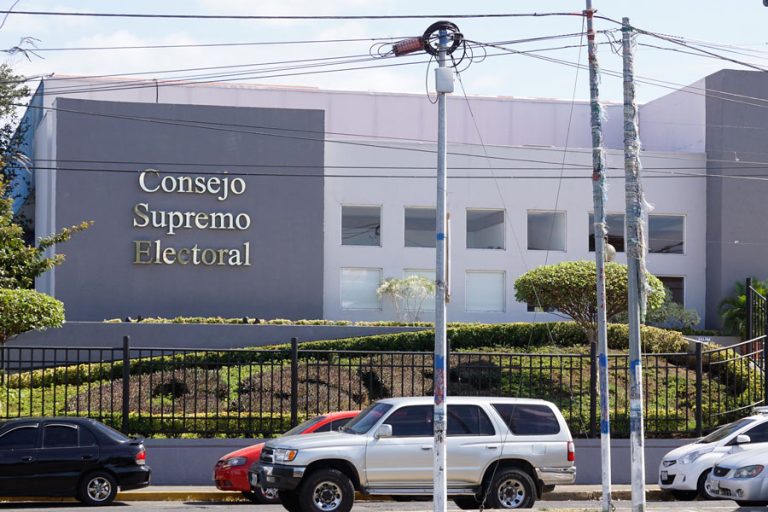16 de abril 2021

Children of Exile: The Births “Sowing Hope” in the Camp of Nicaraguan Farmers

PUBLICIDAD 1M
PUBLICIDAD 4D
PUBLICIDAD 5D
The FSLN electoral reform is aimed at undermining the already existing structure of the political parties. It would obligate them to incorporate women,

Reclaman que Ortega busca quitarse de encima la demanda de elecciones libres y transparentes
In world statistics, Nicaragua appears to be an extraordinary country in terms of women’s participation in decision-making. It’s in fifth place, I believe, just behind the Scandinavian countries. Those numbers, however, reflect a fiction created by the Ortega-Murillo regime.
These statistics have been manipulated, just like the COVID-19 data managed by the Ministry of Health. They lack any real backing. In Nicaragua, there are women named to positions, but they are game pieces on an illusory board. They have so little relevance that the population doesn’t even know the names of those who head the Ministries. They’re the executors of “orders from above”, lacking authority and autonomy.
The National Assembly now proposes to pass reforms to the Electoral Law in the next few days. These reforms are also without public consultation, and in response to “orders from above”. They impose an obligatory quota of 50% women in all the electoral structures. This is a demand aimed at undermining the organization that already exists in the political parties. It would obligate them to incorporate women, just to say they did.
Of course, I agree with the idea that there should be women in the electoral structures. However, demanding a 50 -50 ratio of gender representation is an artificial measure that presupposes a reality far distant from ours.
We women haven’t only been marginalized from many spheres of society by the machismo inherent to our development. We’ve also been marginalized because, in the current social and labor organization, we carry all the responsibility for caring for our families and homes.
The woman is responsible for feeding and caring for the children; she’s the one charged with caring for the elderly and the sick. She does the arduous daily labor, whose value is neither recognized nor remunerated. The work of caring has impeded and, in many cases cut short, the education of our female population.
There are many young women in the universities, it’s true. But after they marry and have children, few of them can assume positions that demand their absence from home from 8 am to 5 pm. Those who do so depend on other women, either relatives or domestic employees, to do the housework and care for the children or elderly.
This is a country where the labors of caring are considered “women’s work”. Men feel that they’re lowering themselves if they cook, wash clothes, iron or take care of the children. As a consequence, it’s illusory and a political trap to demand parity in the electoral structures. Without parity in the care functions and in domestic work, the truth is that this kind of parity can’t exist.
There’s another aspect that’s been seen even in countries like France, where political parity was attempted. Women have the perception – unfortunately true – that assuming political functions means exposing themselves to constant belittling. The present organization and culture of the political classes is averse to feminine presence. Hence, women lack incentives to become involved.
Many prefer the anonymity of their daily lives to getting into positions where they’ll be badly paid or be there merely “as decoration”. That’s the case of those who currently occupy posts or positions of “direction”. They are only there so the Vice President can exhibit Nicaragua as the egalitarian country it’s actually so far from being.
There’s no doubt that Nicaragua women have distinguished themselves by their presence, daring, and energy in the struggles of our country. But this power is more moral than real.
For all these reasons, the demand for parity in this Electoral Law the regime wishes to impose is arbitrary, limiting and menacing. They merely plan to continue the smokescreen that, in this country, women enjoy extraordinary social and labor mobility.
It’s enough to look at the high rate of femicides, the horrendous crimes against women, the widespread persistence of sexual abuse and domestic violence. Then there’s the rate of teen pregnancies in our country, the highest in Central America. A glance at all these is enough to discover that talk of parity in the electoral structures here is merely another way to disparage and obstruct the electoral structures of the opposition.
Archivado como:
PUBLICIDAD 3M
Poeta y novelista nicaragüense. Ha publicado quince libros de poemas, ocho novelas, dos libros de ensayos, una memoria, y cuatro cuentos para niños. Su primera novela “La mujer habitada” (1988) ha sido traducida a más de catorce idiomas. Ganadora del Premio La Otra Orilla, 2010; Biblioteca Breve, de Seix Barral (España, 2008); Premio Casa de las Américas, en Cuba; Premio Internacional de Poesía Generación del ‘27, en España y Premio Anna Seghers de la Academia de Artes, de Alemania; Premio de Bellas Artes de Francia, 2014. En 2023 obtuvo el premio Reina Sofía de Poesía Iberoamericana, el más prestigioso para la poesía en español. Por sus posiciones críticas al Gobierno de Daniel Ortega y Rosario Murillo, fue despatriada y confiscada. Está exiliada en Madrid.
PUBLICIDAD 3D